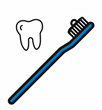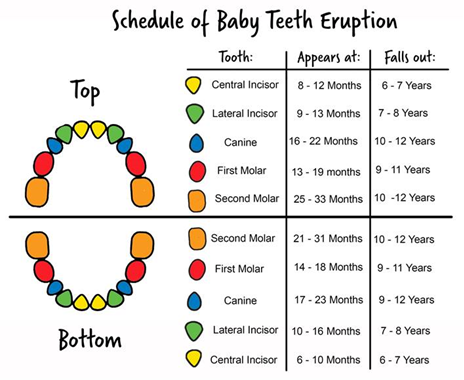First teeth usually appear at around six months of age, but this will vary from child to child. By around the age of three children will have all 20 of their baby teeth. When they reach five or six years old, these teeth will begin to fall out and are replaced by 32 adult teeth.
teeth usually appear at around six months of age, but this will vary from child to child. By around the age of three children will have all 20 of their baby teeth. When they reach five or six years old, these teeth will begin to fall out and are replaced by 32 adult teeth.
Caring for teeth, until children are able to take care of them for themselves is an important responsibility of parents and carers. As well as regular brushing and a tooth friendly diet, it is important to think about choices around feeding and soothing your baby.
How To Brush Teeth
 Use a small round headed toothbrush and smear of toothpaste.
Use a small round headed toothbrush and smear of toothpaste.
Brush at least twice a day. Just before bed and another time that fits in with your routine.
Although we eventually develop adult teeth, baby teeth are very important as they;
There is a high risk of tooth decay if baby teeth are not cared for. This can cause painful toothache and possible infections for your child. In some cases children will have to go into hospital to have rotten teeth removed.
Keeping Teeth Healthy
 rush teeth twice a day using fluoride toothpaste containing no less that 1000ppm fluoride.
rush teeth twice a day using fluoride toothpaste containing no less that 1000ppm fluoride. First teeth usually appear at around six months of age, but this will vary from child to child. By around the age of three children will have all 20 of their baby teeth. When they reach five or six years old, these teeth will begin to fall out and are replaced by 32 adult teeth.

You can contact the Healthy Child Service team by calling Just One Number on 0300 300 0123 or texting Parentline on 07520 631590. Our opening hours are 8am-6pm Monday-Friday (excluding bank holidays) and 9am-1pm on Saturdays.
To speak to other Norfolk parents and carers, you can join our online community forum below.